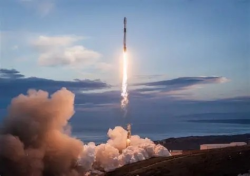

Scientists are warning that the rapid growth of the space industry is driving dangerous levels of pollution in the upper atmosphere and requires urgent international regulation.
Research led by University College London (UCL) has found that rocket launches have more than tripled their emissions in recent years, releasing over 153,000 tonnes of fuel into the atmosphere since 2020. In 2024 alone, a record 259 launches took place, driven by demand for mega-constellations such as SpaceX’s Starlink and OneWeb.
Unlike surface-level emissions, soot and carbon dioxide from rockets are injected directly into the upper atmosphere, where they can linger for years and have up to 500 times the warming impact of the same gases at ground level. Upcoming projects, including Amazon’s Kuiper satellite network, could intensify the problem, with some vehicles still using solid fuels that release chlorine compounds known to deplete the ozone layer.
The study also highlights the environmental risks posed by burning debris. More than 2,500 defunct satellites and rocket parts re-entered Earth’s atmosphere in 2024, releasing reactive metal particles during re-entry. While the long-term effects remain unclear, scientists warn that these novel pollutants could alter atmospheric chemistry and affect the protective ozone layer.
Professor Eloise Marais, who led the UCL study, said: “We’re in uncharted territory, as humans have never added this much pollution to the upper layers of the atmosphere. If left unregulated, it may have serious impacts on Earth’s atmosphere and climate.”
Currently, international space law places responsibility for launches on individual countries, but experts argue this framework is outdated and does not address the global nature of atmospheric pollution. Researchers are calling for coordinated international action to limit rocket emissions, set environmental standards for fuels, and monitor the growing risks from satellite re-entry.
Environmental groups say the findings should serve as a wake-up call for governments and space companies, urging the creation of a global framework to ensure space activity is sustainable for both the industry and the planet.